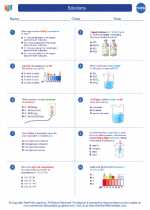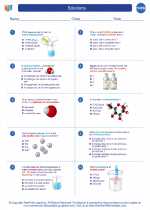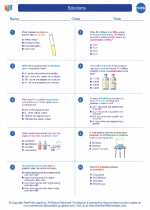Physical Responses
Physical responses refer to the changes that occur in matter without altering its chemical composition. These responses can be observed and measured without any change in the substance's identity. Understanding physical responses is crucial in the study of chemistry as it helps in identifying and characterizing different substances and their properties.
Types of Physical Responses
There are several types of physical responses that occur in matter, including:
- Change in State: This involves the transition of a substance from one state to another, such as solid to liquid (melting), liquid to gas (evaporation), or gas to liquid (condensation).
- Change in Shape or Size: This refers to alterations in the shape or size of a substance without any change in its composition, such as crushing, cutting, or stretching.
- Change in Density: Density is the mass of a substance per unit volume. Physical responses can lead to changes in the density of a substance, such as compression or expansion.
- Change in Solubility: Some substances can dissolve in others, leading to a change in their solubility. This is a physical response as it does not alter the chemical composition of the substances involved.
- Change in Conductivity: Conductivity refers to the ability of a substance to conduct electricity. Physical responses can lead to changes in conductivity without affecting the substance's chemical composition.
Study Guide for Physical Responses
To effectively understand physical responses in chemistry, consider the following study guide:
- Basic Concepts: Understand the basic concepts such as states of matter, density, solubility, and conductivity.
- Observation: Practice observing physical changes in substances. This can include activities such as melting ice, dissolving salt in water, or stretching a rubber band.
- Measurement: Learn to measure physical properties such as volume, mass, and density using appropriate tools and units.
- Comparative Analysis: Compare and contrast the physical properties of different substances to identify patterns and trends.
- Experimental Skills: Gain experience in conducting experiments that involve physical responses, and analyze the results to draw conclusions about the properties of the substances involved.
Importance of Understanding Physical Responses
Understanding physical responses is essential in various fields, including:
- Material Science: Engineers and material scientists rely on an understanding of physical responses to develop and test new materials for various applications.
- Pharmaceuticals: Pharmacists and drug developers need to understand the physical properties of compounds to ensure their effectiveness and stability.
- Environmental Science: Studying physical responses in natural systems helps in understanding phenomena such as water cycle, weather patterns, and geological processes.
By mastering the concepts and applications of physical responses, one can gain a deeper understanding of the behavior of matter and its implications in different fields of science and technology.
.


